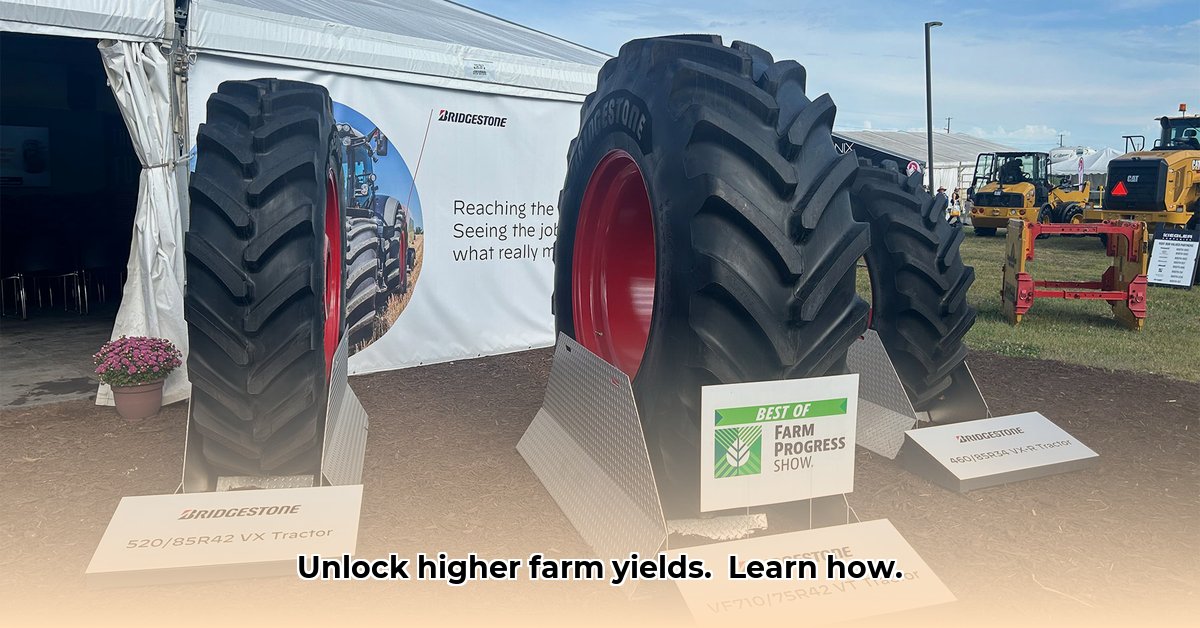
Bridgestone Tractor Tires: A Technical Analysis of Sustainability Claims
Choosing the right tractor tires significantly impacts farm efficiency and environmental sustainability. Bridgestone offers three tractor tire lines—VX-TRACTOR, VT-TRACTOR, and VX-R TRACTOR—promising improvements in fuel efficiency, soil compaction reduction, and tire lifespan. This article analyzes these claims, highlighting the available evidence and identifying crucial research needs. For additional context on agricultural machinery, see information on tractor serial numbers.
Fuel Efficiency: The Impact of Innovative Design
Bridgestone attributes fuel efficiency gains to the Involute lug design, which minimizes wheel slippage. While this design intuitively reduces fuel waste, quantifiable data from independent testing remains absent. How much fuel, precisely, is saved? This crucial question demands rigorous, controlled testing across diverse farming conditions. The lack of independent verification currently limits the conclusive assessment of fuel efficiency benefits. Isn't precise data critical for informed decision-making by farmers?
Soil Compaction: Minimizing Environmental Impact
Bridgestone's VT-TRACTOR tires utilize S-Line Technology, designed to lessen soil compaction, particularly at Very-High-Flexion (VF) inflation pressures. The VX-R TRACTOR further enhances this with its Ultra-Wide Design (UWD). However, the extent to which these technologies reduce soil compaction requires quantitative data from standardized testing. Specific figures demonstrating the reduction in compaction are currently unavailable. Without this data, evaluating the environmental benefits remains challenging. How can we truly assess the long-term effects on soil health if we lack concrete data?
Tire Lifespan: Extended Durability and Reduced Downtime
Bridgestone’s emphasis on durability centers around the use of specialized rubber compounds and technologies such as ENLITEN (in VX-R TRACTOR models). While prolonged lifespan translates to reduced downtime and cost savings, quantitative data substantiating these claims is needed. How much longer do these tires last compared to competitors under identical operating conditions? Long-term field trials are essential to validate the claimed increase in tire lifespan. The absence of this information hinders a complete evaluation of the overall economic benefits. Wouldn't robust data on tire longevity support confident purchasing decisions?
Sustainability: A Holistic Perspective
Assessing the true sustainability of Bridgestone’s tractor tires requires a comprehensive Life Cycle Assessment (LCA). Such an LCA would encompass the entire tire lifecycle from raw material sourcing to manufacturing, usage, and disposal. This would allow a thorough evaluation of carbon emissions and the overall environmental footprint. Without a comprehensive LCA, it's difficult to fully evaluate the tires' contribution to a truly sustainable farming system. How can we confidently claim sustainability without a rigorous LCA?
Future Research Needs and Collaborative Efforts
Addressing the gaps in the current evidence base necessitates a collaborative effort involving Bridgestone, independent research institutions, farmers, and government agencies. Specifically, this requires:
- Independent Fuel Efficiency Testing: Rigorous testing across diverse conditions to quantify fuel savings.
- Standardized Soil Compaction Studies: Objective measurement of compaction reduction using validated methodologies.
- Long-Term Durability Trials: Comprehensive field studies to accurately determine tire lifespan.
- Comprehensive Life Cycle Assessment (LCA): A thorough evaluation of the environmental impact of the tire throughout its entire lifecycle.
Stakeholder Implications
The results of such research efforts are crucial for numerous stakeholders:
- Farmers: Reliable data enables informed purchasing decisions, optimizing costs and minimizing environmental impact.
- Bridgestone: Validated data enhances the credibility of marketing claims and fosters consumer trust.
- Researchers: This research contributes valuable insights into sustainable agriculture practices.
- Government Agencies: Data-driven insights inform policy decisions promoting sustainable farming.
Conclusion: The Path to Data-Driven Decisions
Bridgestone's technological advancements in tractor tires hold promise for enhancing farm efficiency and promoting sustainable agriculture. However, a clear understanding of their true impact necessitates rigorous and transparent research. Only through independent verification and comprehensive data collection can farmers make informed decisions, and the industry progress towards a truly sustainable future. The current absence of comprehensive data underscores the critical need for collaboration and further research to fully assess the long-term benefits of Bridgestone's tractor tire offerings.